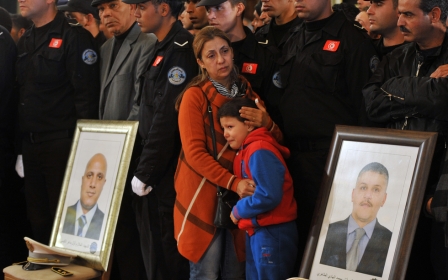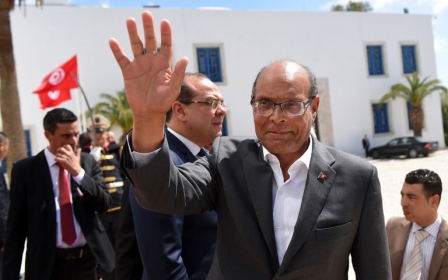Tunisia bus bomber may have been former presidential guard member

Investigators in Tunisia are still scrambling to identify the final body from Tuesday's bloody attack in the capital, with authorities saying they believed the man to be the suicide bomber but uncertainty over his nationality and links.
Thirteen people, including the suspected bomber, were killed – 20 people were also injured in the blast, including four civilians.
The alleged suicide bomber is now known to have had a backpack filled with 10kg of military-grade TNT on board a bus packed with members of Tunisia’s presidential security guard on Tuesday night.
The attack was later claimed by the Islamic State group, which named the bomber as Abu Abdullah al-Tunisi, implying that he may have been a Tunisian citizen.
Twelve of the victims have already been identified by their fingerprints – however, the 13th body was found without fingers, Tunisia’s security services announced on Wednesday.
The head of the presidential guard union, Hisham al-Gharbi, told Tunisia’s National Radio station on Wednesday that the attacker was a former member of the guard who was fired after he was discovered to have links to extremist organisations.
In the wake of the bombing, Prime Minister Habib Essid imposed a state of emergency and a curfew in the capital.
Tuesday’s assault was the third major attack to hit Tunisia in 2015 – both previous attacks have principally targeted Tunisia’s lucrative tourist industry.
In March, three people attacked the Bardo National Museum in central Tunis, killing 22 people, while in June a lone gunman killed 38 people, 30 of them British tourists, at a tourist resort near Sousse.
On Wednesday, in the aftermath of the year’s third mass casualty attack, authorities announced that they would close the country’s border with Libya for 15 days.
The Interior Ministry has said the explosive used in the bus bombing was the same as material used to make suicide belts that were seized last year after being smuggled across the border from Libya.
Tunisia will also attempt to recruit 6,000 more security forces.
Stay informed with MEE's newsletters
Sign up to get the latest alerts, insights and analysis, starting with Turkey Unpacked
Middle East Eye delivers independent and unrivalled coverage and analysis of the Middle East, North Africa and beyond. To learn more about republishing this content and the associated fees, please fill out this form. More about MEE can be found here.




